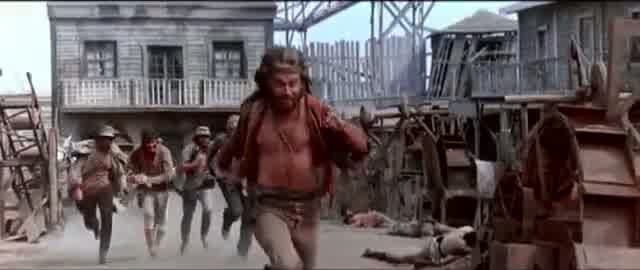Director:
Enzo G. CastellariCámara:
Aiace ParolinReparto:
Franco Nero, William Berger, Olga Karlatos, Orso Maria Guerrini, Woody Strode, Antonio Marsina, Joshua Sinclair, Victoria Zinny, Alfio Caltabiano (más)Streaming (1)
Sinopsis(1)
Tras haber peleado al servicio de los ejércitos de la Unión en la Guerra de Secesión, el mestizo Keoma (Franco Nero) emprende el regreso a su pueblo, a donde llegará en compañía de una bella mujer embarazada (Olga Karlatos) a la que ha rescatado en el camino de quienes pretendían aislarla por considerarla poseedora de la peste. Tras reencontrarse con su padre que lo tiene en alta estima (William Berger) y con sus tres hermanastros que le odian... Keoma tendrá que vérselas con Caldwell y su pandilla, quienes tienen sometido al pueblo. (Filmin)
(más)Reseñas (3)
"The world keeps going around and around so you always end up in the same place." Keoma represents Freedom, the old hag with the cart symbolizes Death, and the unborn child stands for Life. Symbolism, mysticism, Shakespeare, Peckinpah. Now you have the necessary clues to navigate the somewhat patchy story of the continually revised script and understand why Franco Nero, after returning from Woodstock, immediately dove into producing slowly dying unfree villains while playing the music recordings made there. The spaghetti is gone, the circle is closed. Franco can return Björn Borg’s wig. "He can't die. And you know why? Because he's free. And a man who's free never dies."
()
I haven't been as impressed with a spaghetti western as Desperado in a long time. And it's all the more interesting because (as far as I know) it has nothing at all to do with Sergio Leone or Ennio Morricone. Yet it dazzles with everything it has to offer. At first glance a simple, yet brilliantly delivered and ultimately dense fate story full of excellent characters, stunning direction to match Leone, catchy music, the actors... Like I said, everything.
()
One of the most visually impressive (late) spaghetti westerns, with polished widescreen compositions that even Leone himself would envy. A pleasantly atypical western with avant-garde editing (ingeniously combining past and present), an almost post-apocalyptic atmosphere of a dusty city decimated by plague (the night scenes lit by torches are reminiscent of the Middle Ages), religious symbolism and a charismatic Franco Nero with the visage of Jesus. It's a hodgepodge of everything from Shakespeare to Bergman to Peckinpah, but surprisingly it works as a whole. The only thing that throws it off is the bizarre soundtrack, with its whiny ballad songs in which two singers comment directly on what's happening in the film.
()

